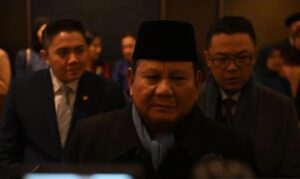Prabowo Subianto Vows to Renovate Schools and Enhance Education Infrastructure

Jakarta, The Gulf Observer: Indonesia’s new President, Prabowo Subianto, and Vice President, Gibran Rakabuming Raka, who were sworn into office on October 20, 2024, have pledged to address the long-standing issue of school neglect across the country. In his inaugural address, President Prabowo emphasized the urgency of renovating schools as a key part of his administration’s agenda.
“Many of our schools are neglected. We must dare to recognize and solve all of these problems,” President Prabowo stated, outlining his “8 Best Fast Result Programs,” one of which focuses on improving education infrastructure. The initiative aims to enhance the quality of primary and secondary education through comprehensive renovations and the construction of new, top-quality schools.
The program, which is set to be implemented over the next five years, will see the renovation of 22,000 schools nationwide, with a budget allocation of Rp20 trillion (approximately US$1.2 billion). In addition, Rp4 trillion (around US$257 million) has been earmarked for the construction of integrated schools from the primary to high school levels, including both boarding and non-boarding models. These institutions will serve as benchmarks for educational excellence across the country.
According to the Ministry of Primary and Secondary Education (Kemendikdasmen), the number of schools in Indonesia—ranging from kindergartens to vocational high schools—totaled 399,376 in 2023. A significant portion of these schools, particularly in rural and underserved areas, face serious infrastructure challenges, with classrooms in dire need of repair. For example, 8.70% of elementary school classrooms and 5.57% of junior high school classrooms were reported to be in severe condition.
The Indonesian Teachers Association (PGRI) has welcomed the renovation program but stressed the need for careful planning to ensure that schools are built in locations accessible to students. The association also called for attention to be given to private schools, which play a vital role in providing education access to millions of students.
While infrastructure improvements are crucial, the success of the program also hinges on addressing the country’s human resource challenges in education. According to the Ministry of Administrative and Bureaucratic Reform (Kemenpan RB), there are over 731,000 honorary teachers and nearly 300,000 Government Employees with Work Agreements (PPPK). The Ministry of Education and Culture has aimed to appoint one million teachers as PPPKs, but as of 2023, only 544,000 had been appointed, with many teachers still waiting for certification and professional allowances.
President Prabowo’s education reform is seen as a critical step towards achieving the Golden Indonesia 2045 vision, with the ultimate goal of enhancing the quality of student achievements and contributing to national development. The administration has vowed to implement strict supervision and efficient budget management, ensuring that corruption does not hinder the program’s success.
As President Prabowo remarked, “It will take the efforts and collaboration of all elements, from ministries and institutions to families, to improve the quality of students and achieve the Golden Indonesia goal.”
The ambitious program reflects the government’s commitment to revitalizing Indonesia’s education system and preparing the next generation for the country’s future.


